Explore six key strategies for efficient real estate data collection in marketplaces, focusing on accuracy, automation, privacy and consistency to enhance decision making and deliver actionable insights for better business outcomes.
Contents
Real estate marketplaces today have become much more powerful and user friendly, offering numerous features and facilities. However, it all runs on data, and poor-quality data can quickly derail opportunities and damage relationships with clients where trust is critical. The issue isn’t about the volume of information, but ensuring what is collected and fed to the system is precise, relevant and useful.
With the proptech sector currently valued at $18.2 billion and projected to reach $86.5 billion by 2032, it’s clear that the industry is increasingly focused on leveraging technology to enhance data collection and analysis.
Challenges in Real Estate Data Collection for Marketplace
Real estate marketplaces face numerous challenges in managing data effectively, which can complicate decision making and hinder market insights.
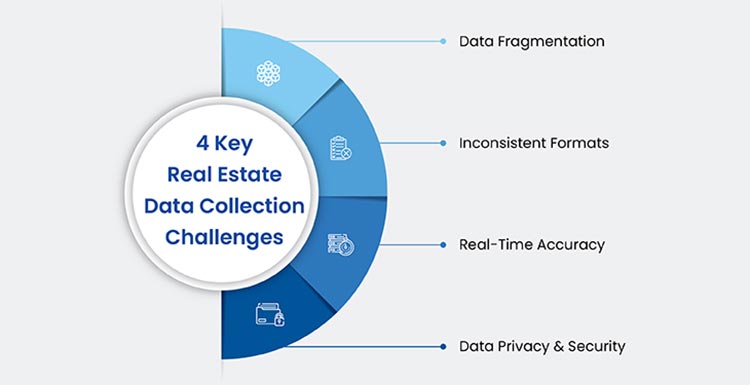
Without a structured strategy to manage this influx of buyer behaviors, property details, and market trends, the process of collecting data can become overwhelming. The priority should be clear: real estate data collection that is accurate and actionable enough to support intelligent decisions.
6 Tips for Collecting Real Estate Data for Marketplaces
Effective data collection is vital for real estate marketplaces to enhance decision-making, improve user experience, and stay competitive. By following best practices and data collection tips like ensuring data accuracy, focusing on privacy, leveraging technology, and standardizing processes, marketplaces can gather high-quality, actionable insights that drive business growth and customer satisfaction.
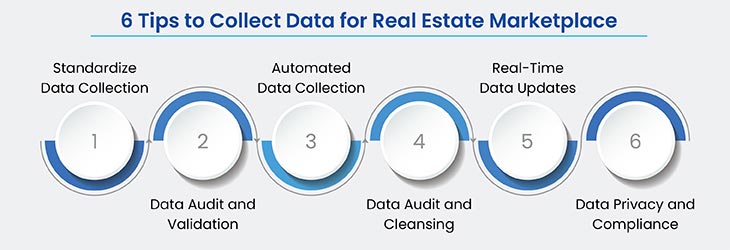
Standardize Data Collection Processes
Consistency is the key to managing data effectively. Standardizing data collection processes helps ensure that information gathered from various sources is uniform, accurate and easily manageable. For real estate marketplaces, this means creating a structured approach that simplifies data management, improves efficiency and enhances data quality across the board.
To standardize data collection, we first implement data cleansing by assessing existing property listings, client databases, and transaction logs for errors. Standardize key fields, remove duplicates, rectify inaccuracies, and fill missing values using automated tools. Put regular data audits and processes in place to maintain data accuracy and compliance.
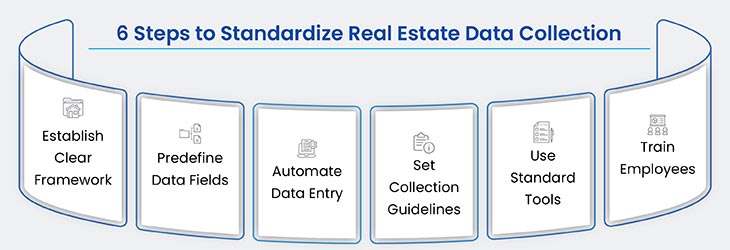
How to Standardize Data Collection Processes in Real Estate
- Develop a Clear Data Collection Framework: Establish a comprehensive framework that outlines the specific data points to be collected, the sources from which they should be obtained and the methods to be used. This ensures that all team members and external partners follow the same procedures.
- Use Predefined Data Fields and Formats: Ensure that all data inputs, such as property details, customer information, and market trends, are captured in predefined formats. For example, using consistent fields for property size, location and price ensures that the data can be easily compared and analyzed.
- Implement Automation for Data Entry: Wherever possible, automate data entry processes to reduce human error and improve accuracy. Automation tools can help capture data from multiple sources and populate it into standardized fields, ensuring uniformity and efficiency.
Learn how HabileData managed 10 million records monthly, using automation tools to collect, cleanse, and verify data from multiple sources
- Create Data Collection Guidelines: Provide clear and detailed guidelines for all team members involved in real estate data collection. These guidelines should specify how to handle different types of data and clearly define the steps to follow in case of any discrepancies.
- Use Standardized Data Collection Tools: Utilize real estate data collection tools that support standardization, such as CRM systems or property management software, to capture and organize data in a consistent manner. These tools should be able to generate reports and insights based on standardized data, making it easier to track and measure performance.
- Train Employees on Standardized Procedures: Provide ongoing training to staff involved in real estate data collection to ensure they understand the importance of following standardized processes. Proper training helps prevent errors and ensures that everyone in the organization is aligned with the data collection best practices.
Implement Data Audit and Validation Techniques
The correct data audit and validation techniques hold the key to maintaining high-quality data. Any expert providing data collection tips will mention these. Data audit and validation processes help detect errors, inconsistencies, and missing information early, allowing for prompt corrections. This not only enhances the reliability of data, but also protects the company from the risks associated with data breaches or privacy violations.
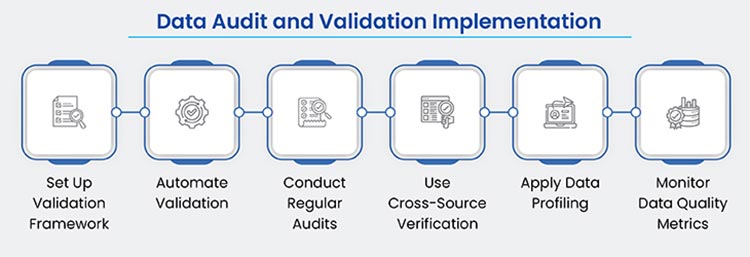
How to Implement Data Audit and Validation Techniques
- Establish a Data Validation Framework: Set up a framework that defines the validation rules for the data being collected. This includes setting parameters for what constitutes accurate data, such as formats for property addresses, acceptable price ranges and complete customer information. Data should be validated at the point of entry to prevent incorrect or incomplete information from entering the system.
- Automate Validation Processes: Use automated tools to validate data in real time, ensuring that data inputs meet the predefined criteria before they are entered into the system. For example, automated validation can check if a property address is valid, if the listed price falls within a logical range, or if all mandatory fields are completed. This reduces the risk of manual errors and improves efficiency.
- Perform Regular Data Audits: Schedule regular data audits to assess the accuracy, consistency and completeness of the data. During these audits, review data points, such as property listings, customer details, and market analysis to ensure that everything is current and correct. Audits help detect anomalies, redundancies, or outdated information that may have slipped through validation processes.
- Implement Cross-Source Verification: For real estate marketplaces, data often comes from multiple sources, whether internal databases, third-party platforms, or public records. Implement cross-source verification to ensure consistency across sources. If discrepancies are identified, investigate the cause and correct the errors accordingly.
- Use Data Profiling Techniques: Data profiling involves analyzing data for patterns, anomalies or missing values. By implementing data profiling, real estate marketplaces can identify recurring issues, such as duplicate listings, inaccurate property information, or incomplete customer records, allowing for proactive correction.
- Monitor and Report on Data Quality Metrics: Track key data quality metrics, such as error rates, validation pass/fail ratios, and the frequency of audit findings. Use this information to continuously improve your data audit and validation processes, ensuring that data quality remains a top priority.
Leverage Technology for Automated Data Collection
Automation in real estate data collection offers significant advantages in terms of efficiency, accuracy and data quality. Manual data entry is prone to errors, delays and inconsistencies, which can negatively impact business operations and client trust.
Automated data collection allows for the seamless integration of data from various sources, such as property websites, customer relationship management (CRM) systems, and public databases. This results in faster access to updated property listings, quicker responses to customer inquiries, and more precise market analysis.
How to Automate Data Collection with Technology
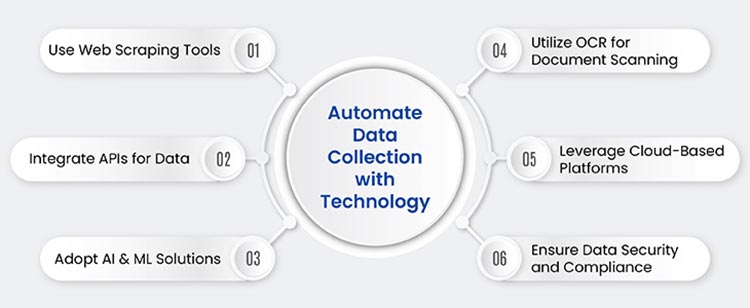
- Implement Web Scraping Tools: Web scraping tools can automatically gather data from property listing sites, social media platforms, and market reports. These tools allow real estate marketplaces to constantly pull in updated property information, pricing trends, and customer preferences without manual intervention.
- Use APIs for Seamless Data Integration: Application Programming Interfaces (APIs) integrate data from multiple platforms, including third-party listing services, public records, and CRM systems. APIs enable real-time data sharing between different systems, ensuring that the information is always current and accurate.
- Adopt AI and Machine Learning Solutions: Artificial intelligence (AI) and machine learning (ML) algorithms can automate the process of data extraction, analysis and validation. For example, AI can analyze customer data to identify patterns and preferences, while ML models can predict market trends based on historical data. These technologies also improve the accuracy and efficiency of data collection by adapting to changing conditions over time.
- Utilize Optical Character Recognition (OCR) for Document Scanning: OCR technology can be used to extract data from physical documents, such as property contracts, inspection reports, and legal papers. By automating the conversion of physical documents into digital data, OCR reduces the need for manual data entry and ensures that important information is easily accessible and searchable.
- Cloud-Based Data Collection Platforms: Cloud-based platforms allow for the centralized collection, storage and analysis of data from multiple sources. These platforms provide scalability, security and accessibility, making it easier to manage large datasets and collaborate with teams across different locations. Cloud solutions also support real-time updates, ensuring that all users have access to the most recent information.
- Ensure Data Security and Privacy Compliance: Automation should be accompanied by strong data security measures to protect sensitive information and ensure compliance with data privacy regulations. Automated systems must be designed to securely collect, store, and transmit data, safeguarding against breaches and unauthorized access.
Focus on Data Privacy and Compliance
With the vast amounts of personal and financial data collected from property listings to client profiles, marketplaces must prioritize safeguarding this information to avoid data breaches and legal repercussions.
Data privacy and compliance not only protect users from fraud and misuse but also ensure that the marketplace adheres to global data protection regulations such as the General Data Protection Regulation (GDPR) or the California Consumer Privacy Act (CCPA).
How can real estate marketplaces ensure compliance with data privacy regulations during data collection?
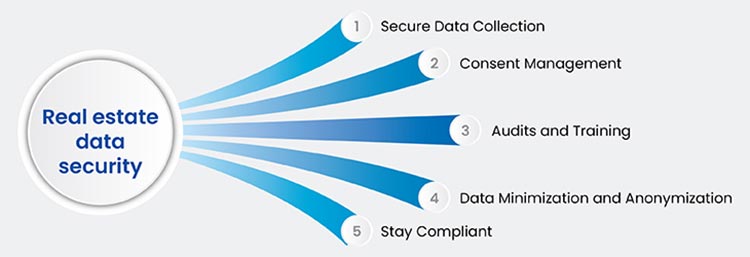
- Adopt Secure Data Collection Practices: Use encryption methods to protect data during collection, storage and transmission. Only collect data that is necessary for a specific purpose and limit access to authorized personnel.
- Implement Consent Management: One of the most essential data collection tips is to ensure transparency by clearly communicating the purpose of data collection. Always obtain explicit consent from users before gathering their information. This practice not only ensures compliance with legal requirements, but also builds trust with customers.
- Conduct Regular Audits and Training: Regular audits help identify vulnerabilities in data handling processes and ensure compliance with the latest regulatory updates. Training staff on data privacy best practices is equally important to minimize the risk of errors.
- Data Minimization and Anonymization: Collect only the data that is essential and, whenever possible, anonymize it to prevent the identification of individuals. This reduces risk exposure in the event of a breach.
- Keep Up-to-Date with Regulatory Changes: Data privacy regulations are continually evolving. Real estate businesses need to stay informed about updates to privacy laws and make necessary adjustments to their processes to remain compliant.
Regularly Audit and Cleanse Data
Clean, accurate data is at the core of effective business operations in real estate. It supports better decision making, enhances customer service, and helps avoid costly mistakes caused by relying on outdated or incorrect information. Regular data audits identify discrepancies, inaccuracies and redundancies that may have accumulated over time, while data cleansing removes or corrects these issues.
For real estate marketplaces, this means ensuring property listings are up-to-date, customer preferences are accurately reflected, and market analysis is based on trustworthy information.
For real estate marketplaces, this means ensuring property listings are up-to-date, customer preferences are accurately reflected, and market analysis is based on trustworthy information.
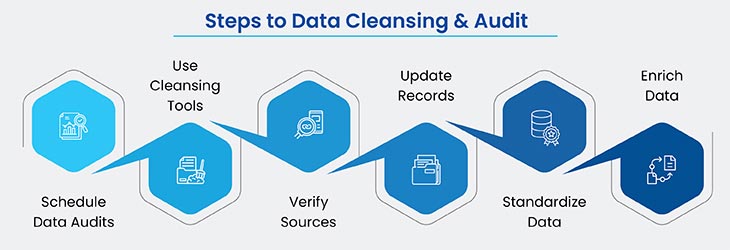
- Conduct Scheduled Data Audits: Set a regular schedule for data audits, such as monthly or quarterly, to thoroughly examine the database for inaccuracies, duplications or missing information. This allows the identification of data that need to be updated or removed.
- Use Data Cleansing Tools: Utilize automated data cleansing tools to streamline the process. These tools can identify duplicates and flag inconsistencies and help maintain data quality, reducing the time and effort needed for manual checks.
- Verify Data Sources: Validate the sources of your data to ensure the information is credible and reliable. Establishing data verification protocols helps minimize the risk of including erroneous data in the system.
- Update Incomplete Records: Incomplete data can hinder the effectiveness of marketing and customer outreach efforts. During audits, prioritize filling in any gaps, such as missing contact information or property details, to improve the quality of your data.
- Implement Data Standardization: Ensure that all data entries follow a standardized format, whether it’s contact numbers, addresses or property specifications. Standardization helps prevent errors and makes it easier to merge or analyze data across different systems.
- Engage in Data Enrichment: Data cleansing is not only about removing inaccuracies, but also about enhancing the quality of your database. Enriching data by adding new, relevant information helps maintain its value and supports targeted marketing and lead generation.
Ensure Accurate and Real-Time Data Updates
Real estate is all about timing. Whether it’s the availability of a property, a price change, or a market trend, having access to the most recent information is essential for making informed decisions. Buyers rely on accurate listings to find their ideal property, while sellers count on up-to-date data to set competitive prices and market effectively. Inaccurate or outdated data can lead to missed opportunities, frustrated clients and damaged credibility.
How to Ensure Accurate and Real-Time Data Updates
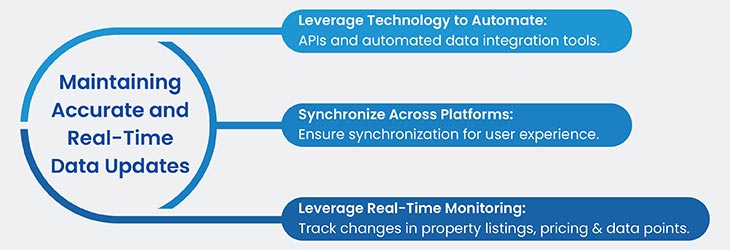
- Automate Data Collection and Updates: Leverage technology, such as APIs and automated data integration tools, to gather data from multiple sources and ensure property listing management in real-time. This helps ensure that information such as availability, pricing, and status changes is reflected instantly on the marketplace.
- Implement Synchronization Across Platforms: Real estate property data is often shared across different platforms, including websites, mobile apps, and listing services. Ensure synchronization between these channels so that users always see the same, updated information regardless of the platform they use.
- Leverage Real-Time Monitoring Systems: Use real-time monitoring tools to track changes in property listings, pricing, and other relevant data points. This ensures that any discrepancies or outdated information are promptly flagged and corrected.
Conclusion
Data is your most valuable asset, but only when it is accurate, actionable and timely. By adopting these six proven data collection tips, you are not just enhancing operational efficiency; you are transforming your marketplace into a data-driven powerhouse. This is where sustainable growth occurs through deeper insights, faster decision-making, and stronger client engagement. Properly leveraged, data just does not inform; it empowers.
Mastering the intricacies of effective data collection positions your marketplace to lead, delivering value that builds trust, fosters loyalty, and drives long-term success. The future of real estate belongs to those who fully harness the power of data, and with these strategies, you are well positioned to shape that future.
Enhance the quality and scope of your real estate marketplace.
Get started today »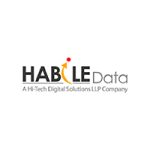
HabileData is a global provider of data management and business process outsourcing solutions, empowering enterprises with over 25 years of industry expertise. Alongside our core offerings - data processing, digitization, and document management - we’re at the forefront of AI enablement services. We support machine learning initiatives through high-quality data annotation, image labeling, and data aggregation, ensuring AI models are trained with precision and scale. From real estate and ITES to retail and Ecommerce, our content reflects real-world knowledge gained from delivering scalable, human-in-the-loop data services to clients worldwide.






